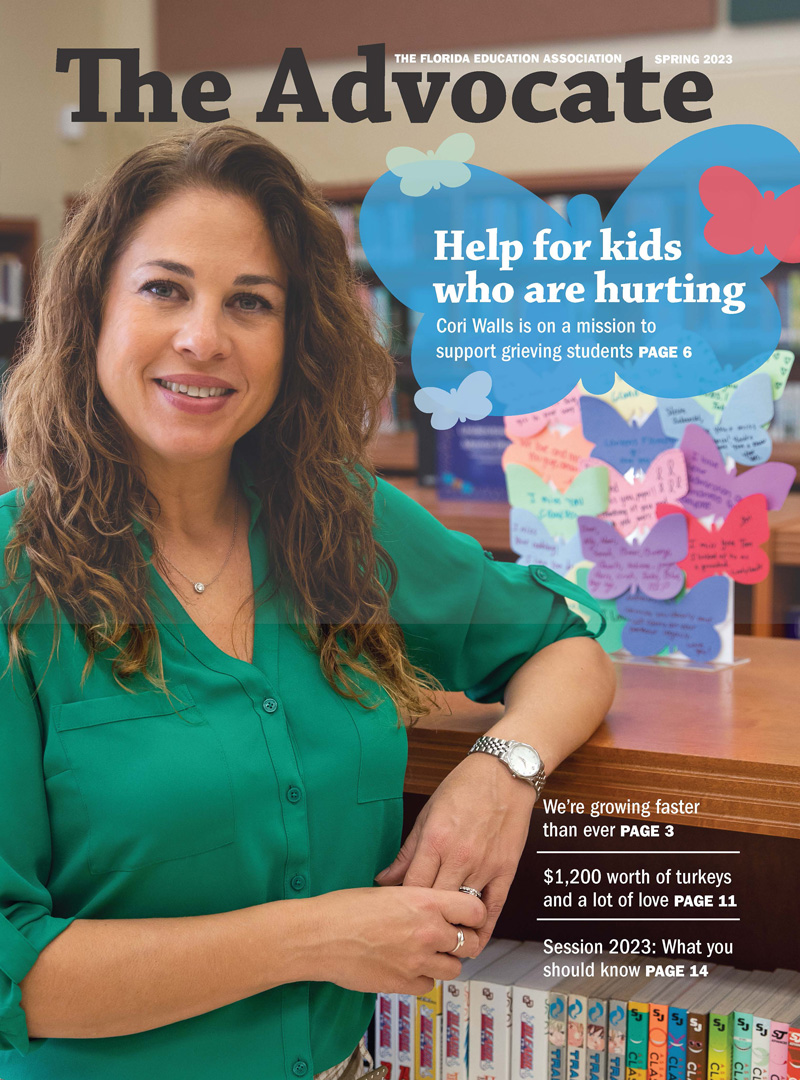In this issue of The Advocate, we’re looking at the ISSUES where we hope to gain ground in the 2021 legislative session and at a few of us — the advocates working to improve the lives of everyone in our public schools.
The 2021 legislative session kicked off March 2 and is scheduled to end April 30, but the Legislature’s work goes on before and often after the session’s set dates. Lawmakers met during January and February during interim committee weeks. Then the regular session is often extended because legislators fail to approve a budget within 60 days. These extensions are for the sole purpose of getting a budget passed, with no other bills being discussed. The budget is the only bill lawmakers must pass.
In some respects much is the same with the 2021 legislative session. For 60 days, senators and representatives will debate school funding along with the Florida Retirement System, testing and accountability measures, continued privatization of public education, and likely an attack or two on workers’ rights and unions.
However, there is also an opportunity for a great reset. When FEA convened parents, students, educators and community stakeholders last spring to create a plan for safe reopening of schools, there was one prevailing thought: A return to normal is not good enough.
In normal times, too many students were left behind by underfunded and under-resourced classrooms and by a system created by state politicians who placed more value on student test scores than on true teaching and learning. Educators have long known the perilous impacts of poverty on students and that those with the greatest needs require the greatest investments — smaller class sizes to allow for individual instruction, access to technology beyond using a computer to take another progress monitoring test, and access to mental health professionals and school nurses. All of those items are necessities, not luxuries, and for too long students in Florida’s poorest neighborhoods have been deprived of those necessities through underfunding.
The pandemic forced legislators to acknowledge the inequities they created but for too long ignored. Our next step must be to compel legislators to address those inequities. The response to the Great Recession was austerity and budget cuts, which led directly to the teacher and staff shortages seen today in Florida’s public schools. Our students cannot afford for legislators to act once again to sacrifice their future, this time using Covid as an excuse to slash funding.
Florida is one of the wealthiest states in the wealthiest country to ever exist. It is time that our public schools are funded as such. When the entire world stopped last March, educators stood in the gap and overcame tremendous obstacles to continue to ensure students’ needs were met. Now, it’s time for the Legislature to step up and fully fund our public schools.
1. Investment
This is about investment in our public schools and investment in education employees. We are calling for lawmakers to preserve and expand the financial investments that are required to keep our students and staff safe and able to learn. Last year, there was progress on pay from two directions — for new teachers through legislation, and for many education staff professionals through the minimum wage amendment. Much work remains to be done to achieve fair wages for all school employees.
2. Multi-year contracts
Qualified educators shouldn’t face the prospect of losing their jobs every year. Florida can retain and recruit more educators if teachers are allowed to earn multi-year contracts.
3. FRS and Retirement Security
The Florida Retirement System must be protected without burdening employees with additional costs. The people who devote their careers to our students deserve no less.
4. Testing
Given the disruption caused by the pandemic, we may be able to truly move the needle on “accountability” in public schools. That could mean less time spent on testing for students and educators, and a move away from high-stakes tests for Florida’s children. We are promoting the use of formative assessment and learning over time spent on standardized tests.
5. Local control
School boards and local unions must have the freedom to negotiate fair and equitable salary plans and working conditions that will best serve their school community. Tallahassee has been calling the shots on too many issues affecting our schools.
How to help make change happen during session
As of our publication deadline, we don’t have a complete picture of the Covid protocols that will be in place when the 2021 legislative session begins March 2. However, it appears they will be much the same as during the interim committee weeks in January and February, when Florida House and Senate leaders took steps to drastically limit interaction with the public.
No matter the circumstances, educators must not allow themselves to be silenced. We must raise our voices even louder than before. Here are some ways to help achieve change:
Make contact: Despite the Covid restrictions in the Capitol, there are many ways you can still reach out
to your elected officials, including snail mail, email and phone calls.
Use social media: Most politicians are on social media platforms such as Facebook and Twitter; many are more responsive online than they are to phone calls or emails. It is important to be professional when interacting online, but you can still hold their feet to the fire. Did they promise to support education as they were running for office? Remind them of that. Do they celebrate last year’s “historic” teacher pay plan? Let them know how that worked out for you and how it has impacted morale at your school.
Write a letter: It may seem old school, but you can get lawmakers’ attention by writing to a local newspaper. For the most success in getting published, keep a letter to the editor under 200 words and write in response to a just-published article or recent news event, citing the newspaper’s own headline if possible.
Attend a virtual event: Many local unions around the state will be holding virtual townhall meetings to give you the opportunity to talk to and hear from your lawmakers.
Tell your story: No matter how you speak up, we cannot emphasize enough the power of your personal story. If you see kids not getting what they need, if a state policy is causing you grief — tell it! Personal stories can move a lawmaker’s heart or swing public opinion in educators’ favor.
Stay engaged! Please watch for our emails, texts and posts. To stay informed about what’s going on, visit feaweb.org/session. It’s also easy to join the conversation on social media:
What’s all the excitement about … meetings?
Our best chance to affect legislation is during the committee process
From time to time you might get an urgent e-mail request or see an action alert asking you to contact members of a committee in the House or Senate. Given that the inner workings of the Legislature are opaque by design, we wanted to give a quick refresher on one of the most important, but least well understood, aspects of session — the committee process.
In order for a bill to advance to the full chamber, it must be voted favorably in each committee to which it is assigned — typically three committees. Both the House and Senate have a couple dozen committees and subcommittees ranging from government oversight to education to healthcare.
Each committee consists of a handful of legislators who are, ideally, knowledgeable on the committee’s subject matter. Unlike when the full House or Senate is in session, committee meetings accept public input. For that reason, the meetings are the best chance to get a bill amended.
With more than 3,000 bills filed annually, committees serve as guardians determining which bills advance to the entire chamber. Last session, almost 60 percent of the 3,000-plus bills filed died in committee. That’s typical. Some bills that die in committee are voted down, but most simply never get a hearing.
Sometimes that’s a good thing. Last year, anti-union House Bill 1 sailed through its House committees and was passed rapidly by the full House. Its companion bill in the Senate was never placed on the agenda of its first assigned committee. HB 1 didn’t become law because it never advanced in the Senate.
As you can see, committees play a very important role in what bills do, and do not, become law. So, next time you see a request from FEA or your local union to reach out to a committee, please act quickly. Your voice can help push a good, pro-public schools bill forward, or stop anti-public education legislation in its tracks.





